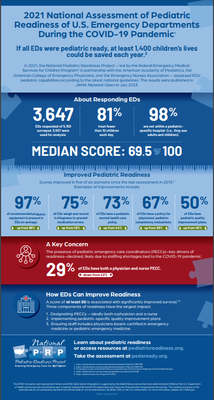Spread the word
- National Pediatric Readiness Project
- About
- Assessment
- Checklist & Toolkit
- Publications
- Spread the Word
- FAQs
- Contact
Understanding the 2021 results


Use our sample messaging to help spread the word: pediatric readiness is a health care imperative.
Social media posts and graphics
NPRP social media: Twitter and Facebook
- Thanks to your help, in 2021, @PedsReady assessed the pediatric capabilities of 3,500+ emergency departments. Learn about the findings and why pediatric readiness is a health care imperative: https://bit.ly/NPRP2021results #PedsReady
- Your response to the NPRP Assessment helps us understand gaps in pediatric readiness nationwide – and identify strategies to address them. Read the results in @JAMANetworkOpen: https://bit.ly/NPRP2021results @PedsReady #PedsReady
- EDs have improved their pediatric capabilities, but since survival increases significantly above 87 points – there is still work to do. Start improving your pediatric readiness at https://bit.ly/pedsreadyproject or take the assessment at www.pedsready.org. @PedsReady #PedsReady
- Does your ED have the three elements most likely to drive improved pediatric outcomes? Start improving your pediatric readiness at https://bit.ly/pedsreadyproject or take the assessment at www.pedsready.org. @PedsReady #PedsReady
Newsletter blurb
National data published on pediatric capabilities of emergency departments
The results of an assessment of the pediatric capabilities of more than 3,500 emergency departments (EDs) nationwide have been published in JAMA Network Open. The assessment was conducted by the National Pediatric Readiness Project (NPRP), an initiative led by the federal Emergency Medical Services for Children Program in partnership with the American Academy of Pediatrics, American College of Emergency Physicians, and Emergency Nurses Association. The assessment gauges pediatric readiness based on an ED’s level of adherence to the latest national guidelines on pediatric emergency care. The results found a median score of 69.5 out of 100. While the results represent progress from the last assessment in 2013, high pediatric readiness – or scoring above 87 points – is associated with marked improvements in survival. To improve readiness, the study emphasizes the importance of designating pediatric emergency care coordinators (PECCs), implementing pediatric-specific quality improvement plans, and staffing with physicians board certified in pediatric emergency medicine or emergency medicine.
Learn about pediatric readiness at www.pediatricreadiness.org or take the assessment at www.pedsready.org.
More resources and materials
- JAMA Network Open manuscript
- Press release
- NPRP overview
- NPRP Checklist & Toolkit
- NPRP Assessment
- National research request process
- Pediatric readiness outcomes infographic
- 2021 JAMA assessment results infographic - NEW
Contacts
- Research/assessment/data inquiries pedsready@hsc.utah.edu
- Improvement resources/opportunities contact@emscimprovement.center
- Communications/media communications@emscimprovement.center
